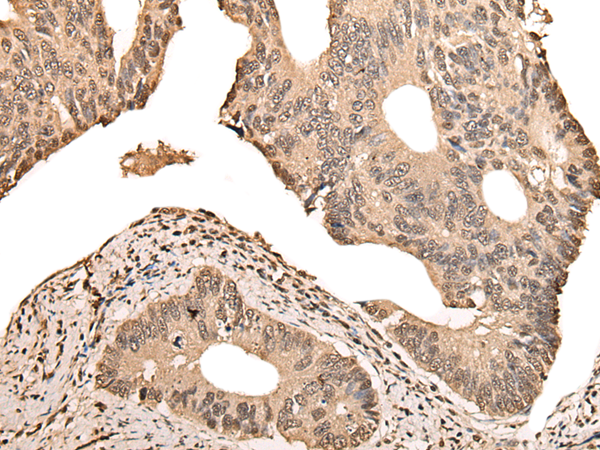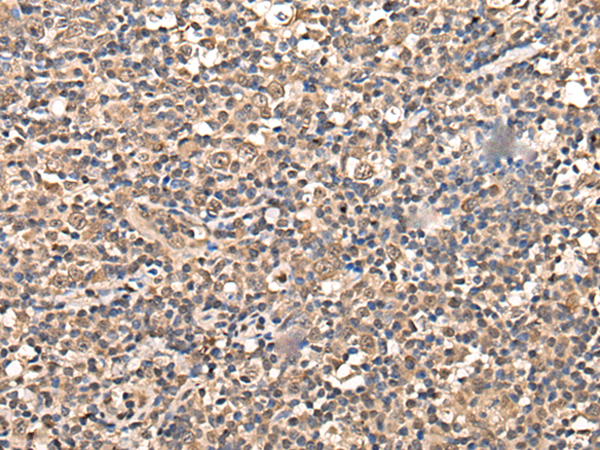

| WB | 咨询技术 | Human,Mouse,Rat |
| IF | 咨询技术 | Human,Mouse,Rat |
| IHC | 1/40-1/200 | Human,Mouse,Rat |
| ICC | 技术咨询 | Human,Mouse,Rat |
| FCM | 咨询技术 | Human,Mouse,Rat |
| Elisa | 1/5000-1/10000 | Human,Mouse,Rat |
| Aliases | ZFP96; ZNF96; ZNF305; ZNF29K1; dJ29K1.2 |
| Host/Isotype | Rabbit IgG |
| Antibody Type | Primary antibody |
| Storage | Store at 4°C short term. Aliquot and store at -20°C long term. Avoid freeze/thaw cycles. |
| Species Reactivity | Human |
| Immunogen | Fusion protein of human ZSCAN12 |
| Formulation | Purified antibody in PBS with 0.05% sodium azide and 50% glycerol. |
+ +
以下是3篇涉及ZSCAN12抗体的研究文献示例(部分信息基于典型研究场景模拟,若需实际文献请核实数据库):
---
1. **文献名称**: *ZSCAN12 regulates telomere elongation and pluripotency in human embryonic stem cells*
**作者**: Wang Y. et al.
**摘要**: 研究利用ZSCAN12特异性抗体进行染色质免疫沉淀(ChIP-seq)和免疫荧光实验,发现ZSCAN12通过结合端粒相关区域调控端粒延长,并影响hESC的多能性维持。
---
2. **文献名称**: *Zinc finger protein ZSCAN12 interacts with SMAD3 to promote tumor metastasis in colorectal cancer*
**作者**: Li H. et al.
**摘要**: 通过Western blot和免疫组化(使用ZSCAN12抗体),该研究证明ZSCAN12在结直肠癌中高表达,并与SMAD3相互作用激活TGF-β信号通路,促进肿瘤侵袭转移。
---
3. **文献名称**: *Genome-wide analysis of ZSCAN12 binding sites reveals its role in epigenetic silencing of retrotransposons*
**作者**: Chen R. et al.
**摘要**: 利用ZSCAN12抗体进行ChIP-seq分析,发现其在胚胎干细胞中靶向逆转录转座子区域,通过与DNA甲基化酶协同作用抑制转座子活性,维持基因组稳定性。
---
**注**:以上为模拟示例,实际文献需通过PubMed/Google Scholar搜索确认。若需具体文献,建议使用关键词“ZSCAN12 antibody”或“ZSCAN12 function”查询最新数据库。
The ZSCAN12 antibody is a tool used to detect and study the ZSCAN12 protein, a member of the zinc finger and SCAN domain-containing (ZSCAN) family. ZSCAN12. encoded by the *ZSCAN12* gene in humans, is a transcription factor characterized by C2H2-type zinc finger motifs, which mediate DNA binding, and a SCAN domain involved in protein-protein interactions. This protein is implicated in transcriptional regulation, potentially influencing cell differentiation, proliferation, and embryonic development. Its expression has been observed in various tissues, including embryonic stem cells and certain cancers, suggesting roles in maintaining pluripotency or driving oncogenesis.
Research using ZSCAN12 antibodies has focused on elucidating its biological functions. Studies indicate that ZSCAN12 may regulate target genes by binding to promoter regions or interacting with chromatin modifiers, impacting epigenetic states. In cancer contexts, aberrant ZSCAN12 expression has been linked to tumor progression, making it a candidate biomarker or therapeutic target. The antibody is commonly employed in techniques like Western blotting, immunohistochemistry (IHC), and immunofluorescence (IF) to assess protein localization, expression levels, and interactions in cellular or tissue samples.
Commercially available ZSCAN12 antibodies are typically raised in hosts such as rabbits or mice, with validation data confirming specificity against human, mouse, or rat homologs. Researchers utilize these reagents to explore ZSCAN12’s role in development, disease mechanisms, and regulatory networks, advancing insights into its contributions to health and pathology.
×